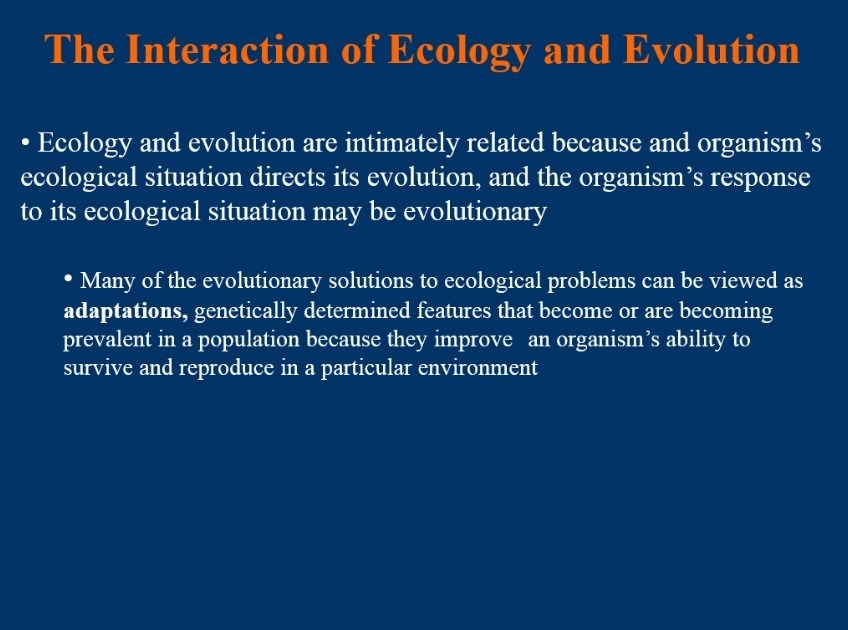I unfortunately did not get back in time to a discussion with Roger Switele
Roger: “First of all, I understand Darwin to say that Variation plus Natural Selection equals Evolution.
Variation is very different from Natural Selection, because variation is based primarily on genes. Also because Variation is truly random, so that real change can take place. The problem that Darwinism has is that it stops with genes and Variation, neglecting Natural Selection.”
Darwin was very clear that Natural Selection was a 2-step process.
- Variation
- Selection.
Variation is part of natural selection. There is nothing to select among if there is no variation.
" I think it would be a most extraordinary fact if no variation ever had occurred useful to each beings welfare, in the same way as so many variations have occured useful to man. But if variations useful to any organic being do occur, assuredly individuals thus characterized will have the best chance of being preserved in the struggle for life; and from the strong principle of inheritance they will will tend to produce offspring similarly characterized. This principle of preservation, I have called, for the sake of brevity, Natural Selection." [Origin, p 103 6th ed.]
That makes it very clear: variations that are preserved (selected) in the “struggle for life”.
Natural selection does not work under the theory of heredity – blended characteristics – accepted in Darwin’s time. Neo-Darwinism or the Modern Synthesis was the realization that natural selection does work in Mendelian genetics.
But Darwinism does not reject selection. Instead, the allele (form of gene) can persist during selection. Population genetics, which is part of the Modern Synthesis, is natural selection observed in populations and described mathematically. The equations actually describe the effect of natural selection on the frequency of alleles in a population.
Variation is “random” in a very special sense: random with respect to the needs of the individual or the population. Simply put, in a climate growing warmer, just as many deer will be born with longer fur as shorter fur. However, only the shorter furred individuals will do well in the environment.
Roger: “You put the right emphasis on Natural Selection, which determines which alleles will survive and flourish. You just do not separate the two processes which is understandable, because people want to combine them into one. ( Your quote from the Origin goes against Darwin’s use of Malthus to formulate his concept of natural selection, while he used selective breeding for Variation.)”
Darwin combined them into one. Darwin’s use of Malthus comes into play when he said (right before the quote I used above):
“; if there be, owing to the high geometric powers of increase of each species, at some age, season, or year, a severe struggle for life, and this certainly cannot be disputed; then, considering the infinite complexity of the relations of all organic beings to each other and to their conditions of existence, causing an infinite diversity in structure, constitution, and habits, to be advantageous to them, I think it would be a most extraordinary fact if no variation ever had occurred …”
Malthus noted that population increased geometrically while resources increased arithmetically. Therefore, population would outstrip resources. Notice that Darwin uses Malthus’ concept of geometrical population increase. What Darwin realized was that, since resources did not generally increase in most environments, the population would always be greater than the resources. That is, more individuals than there were resources to sustain. The inevitable result of that situation would be a “severe struggle for life”. This was a metaphorical struggle, not murder. But in this struggle, some variations would be “advantageous” to the individual. Again, Darwin is combining variation, Malthus, and selection.
Darwin did not use selective breeding for variation; he used it for _ natural selection_. The breeder acts as the environment and sets the “struggle for existence”. There are more pigeons born than the environment will support: the breeder will only feed so many. The breeder determines which variations are “advantageous” – how he wants the animal to look or behave. So the breeder decides which variations will be “preserved”.
Darwin does put his discussion of breeding of pigeons in Chapter I – “Variation under Domestication”. But look at the subheadings for the chapter: “Domestic Pigeons, their Differences and Origin—Principles of Selection, anciently followed, their Effects—Methodical and Unconscious Selection … Circumstances favourable to Man’s power of Selection” http://darwin-online.org.uk/content/frameset?viewtype=text&itemID=F401&pageseq=1
It’s about selection. It cannot be any clearer. What Darwin (and other breeders) do/did Darwin called “artificial selection”. Because humans artificially set the struggle for existence. Natural selection, on the other hand, was so named because it was the same process happening in nature.
